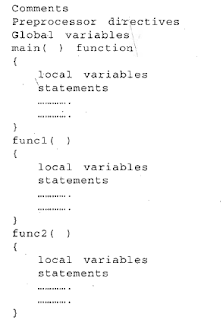C program is a collection of one or more
functions. Every function is a collection of statements that perform a specific
task.
The general structure of C program is:
 |
| Structure of a 'C' Program |
Comments can be placed anywhere in a
program and are enclosed between the delimiters /* at */. Comments are
generally used for documentation purposes. Preprocessor directives are
processed through preprocessor before the C source code passes through compiler.
The commonly used preprocessor directives are #include and #define. #include is
used for including header files. #define is used to define symbolic constants
and macros.
Every C program has one or more
functions. If a program has only one function then it must be main(). Execution
of every C program starts with main() function. It has two parts, declaration
of local variables and statements. The scope of the local variable is local to
that function only. Statements in the main() function are executed one by one.
Other functions are the user-defined functions, which also have local variables
and C statements. They can be defined before or after main(). It may be
possible that some variables have to be used in many functions, so it is
necessary to declare them globally. These variables are called global variables.
No comments:
Post a Comment